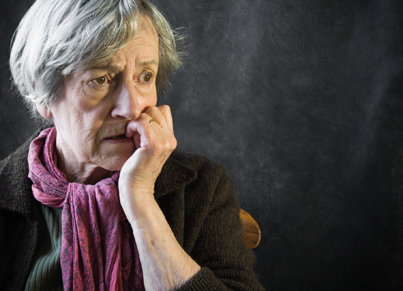Paranoid Symptoms Among Seniors

Paranoid: It’s a Common, Added Stress on Caregivers
Paranoia is one of the symptoms of dementia, and particularly Alzheimer’s disease. With any form of dementia, the brain functioning is compromised or altered and the elderly individual often becomes paranoid about any variety of issues, such as finances, caregivers, terrorism, and so on. Medications may make the problem worse, and the elderly person’s primary care physician needs to evaluate that possibility. However, for most elderly seniors, paranoia is just part of the territory of dementia, Alzheimer’s or not, and may be a natural aspect of the aging mind.
According to an article written by Muzumel A. Chaudhary, MD and Kiran Rabheru, MD, CCFP, FRCP, ABPN, new-onset paranoid symptoms are common among older individuals. They can signify an acute mental status change owing to medical illness, correspond to behavioral and psychological symptoms of dementia, or equate to an underlying affective or primary psychotic mental disorder. The implications of paranoid symptoms are considerable and affect patients, families, and caregivers alike. Accurate identification, diagnosis, and treatment of late-life paranoid symptoms present a unique clinical challenge as issues of morbidity and mortality are inherent both to the illness state and available treatment approaches.
Paranoid symptoms among older adults are of considerable importance as they are linked not only to personal distress but also to caregiver burden. Ideas of persecution and the experience of living in an unfriendly social environment lead to heightened stress, caution, anxiety, and agitation among older persons. The resultant resistive and disruptive behaviors frequently alienate family and friends and leave caregivers frightened, distressed, and exhausted by the increased demands of caring for a paranoid older person.
General paranoid symptoms are common in many psychiatric disorders and as such are nonspecific. However, the detailed description, specific nature, and quality of the paranoid themes may be supportive of a specific group of disorders, such as depression, mania, dementia, schizophrenia, or delusional disorder. Not to mention, psychological disorders among older adults often present many clinical challenges in the face of differing signs and symptoms, origins, and functional changes from presentations among the younger adults. Individuals with late-onset paranoia often have symptom complexes that do not dominate the individual’s mental life, and are frequently concealed. Even with semi-structured interviews, it can often be difficult to reveal important psychopathology. For example, studies of cognitively impaired individuals report that information derived from caregivers yields up to fourfold higher rates of psychopathology than the results of clinical examinations alone.
Because older adults may be reluctant to report paranoid symptoms, or may lack insight into their experiences due to cognitive impairment, it’s necessary to collect collateral information from a reliable third party. Particular attention should be paid to gathering information concerning symptom onset and any associated precipitants (e.g., medication changes, physical health concerns, or new life stressors). Additionally, the symptom form, progression, behavioral manifestations, and any resultant functional impairment should be ascertained.
Dealing with an elder who is experiencing some form of paranoia can be challenging to say the least. However, once the cause of the paranoia is isolated, treatment can be effective. For example, some causes and treatments of paranoid behaviors are:
- Elder thinks people are talking about her behind her back – a physician may first check her hearing to be certain there is no problem in that area.
- Elder swears she sees people who aren’t there – her physician may want to administer a tranquilizing drug to reduce her anxiety.
- Elder is paranoid about her finances – family may want to consistently lay out the elder’s financial picture and have a trusted advisor provide facts.
- Elder is convinced that her family doesn’t love her anymore because they don’t come to visit when the elder thinks they should – the family must remain calm as they offer the reality of the situation.
No matter the diagnosis, the importance and effectiveness of nonpharmacological approaches should not be discounted. Psychoeducation is invaluable for patients, families, and caregivers experiencing conflicting feelings in response to a heightened illness burden. Whether secondary to a lack of interest or reluctance to seek treatment, some level of acceptability of these symptoms, or lack of access to adequate treatment resources, only a minority of affected individuals and their families engage in mental health service utilization. Reassurance for the patient and education for the families are invaluable in promoting greater mental health service use and a reduction in illness morbidity and mortality.
If you’re presently seeking a senior apartment, independent-living, assisted-living, or other continuing-care community for yourself or a senior loved one, don’t forget to visit alternativesforseniors.com to assist your search. Alternatives for Seniors is a print and online directory that specifically caters to the housing and personal care concerns of senior citizens and their families. You can also call our Senior Specialists at (888) WE-ASSIST (888-932-7747).
BLOG Date: Tuesday, March 3, 2015
Writer: Ryan Allen